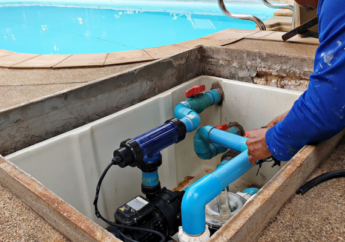Commercial HVAC: How to Choose an Hvac Contractor?
by Ankita Tripathy Business Published on: 17 December 2024 Last Updated on: 11 April 2025

Your commercial HVAC system isn’t just equipment—it’s the lifeblood of your business’s comfort and productivity. It keeps your employees energized, encourages customers to stay longer, and protects the quality of your products. Choosing the right commercial HVAC contractor is more than just a simple decision; it’s an important investment in your system’s efficiency and long-term performance.
So, how do you navigate this decision? It’s not about picking the first name on a search engine results page or going for the cheapest bid. It’s about evaluating expertise, reliability, and long-term value.
Understanding the Scope of Your Needs
Evaluate how HVAC affects employee productivity, customer comfort, and equipment performance. For example, a restaurant may need zoned cooling for the kitchen and dining area, while a data centre prioritizes precision cooling. Consider how the space’s usage fluctuates throughout the day.
Smart HVAC systems with occupancy sensors can adjust airflow and temperature dynamically. Research industry regulations that may influence HVAC design, such as air quality standards in healthcare or specific ventilation needs for manufacturing. Define expectations for energy savings, carbon footprint, and scalability. Can the system grow with the business, or integrate with renewable energy sources in the future?
Why Expertise Is Non-Negotiable
Expertise ensures your contractor understands the nuances of your specific industry. For example, a contractor with experience in food service might prioritize air quality to meet health codes, while one in manufacturing would focus on maintaining consistent temperatures for sensitive equipment. Expertise also means foreseeing potential challenges, such as optimizing airflow in older buildings or integrating new systems with outdated infrastructure, saving you from unexpected disruptions or hidden costs.
Pay attention to the questions they ask. Experienced contractors won’t just ask about square footage—they’ll delve into operational details like peak usage times, equipment placement constraints, and industry-specific HVAC needs. Another differentiator? Their approach to problem-solving. Experienced pros often highlight risks or offer contingency plans during consultations, showing they’re prepared for complex scenarios. Inexperienced contractors, by contrast, tend to give overly simplistic or one-size-fits-all solutions.
Credentials That Build Confidence
Credentials are your first line of defence against poor service. Licensed contractors operate within regulatory frameworks, which means they meet or exceed industry standards. Certifications from reputable organizations are evidence of their technical competence and commitment to professional excellence. A reputable contractor will definitely have:
- Proper licensing in compliance with state and local regulations
- Certifications from recognized organizations like North American Technician Excellence (NATE) or Air Conditioning Contractors of America (ACCA)
- Liability insurance to cover any damages during the project
Always ask for proof of these documents—your business’s safety and compliance depend on it. A reputable contractor will be transparent about their qualifications.
Energy Efficiency as a Business Asset
An exceptional HVAC contractor will evaluate your business operations holistically, considering factors like employee comfort, equipment heat output, and workflow patterns. They can create a custom energy roadmap, combining HVAC upgrades with recommendations for lighting, insulation, and even energy-efficient scheduling. Some contractors go further by offering energy performance contracts, where their fee is tied to the actual savings you achieve, aligning their incentives with your results.
Look for contractors offering high-efficiency heat pumps with variable-speed compressors, which adjust output based on demand, saving energy compared to traditional units.
Advanced air filtration systems combined with energy recovery ventilators (ERVs) improve indoor air quality while conserving conditioned air. Inquire about predictive maintenance technologies using IoT sensors to prevent breakdowns and maintain peak efficiency. Also, seek contractors skilled in installing solar-ready HVAC systems, letting you future-proof your business for renewable energy integration.
Transparent Communication and Pricing
Look for insights into why certain recommendations are made. A great proposal doesn’t just list equipment or timelines—it connects every choice to your building’s specific needs, like optimizing airflow for large open spaces or accounting for seasonal temperature swings. The proposal should also include a clear plan for minimizing business disruption during installation, such as phased work or after-hours scheduling. Contractors who highlight proactive planning show they understand both HVAC systems and your day-to-day operations.
A low bid might mean the contractor plans to “value-engineer” the project—HVAC-speak for reducing quality or efficiency to cut costs. For example, they may size the system incorrectly or use lower-rated components, leaving you with high energy bills or uneven heating and cooling. If the bid lacks detailed explanations for its pricing, ask how they plan to achieve the cost. A contractor who avoids specifics is likely hiding compromises that could cost you far more in repairs and inefficiency down the road.
Pay attention to what they don’t say. A transparent contractor doesn’t just answer your questions—they anticipate concerns you might not have thought of, like future scalability of the HVAC system or long-term maintenance costs. They should also include technical documentation, like equipment specs, energy performance data, and permit requirements, without you having to ask. If a contractor is vague or avoids sharing any potential risks upfront, consider it a warning sign—they’re likely prioritizing the sale over your trust.
The Importance of Ongoing Maintenance
Commercial HVAC maintenance isn’t just about preventing breakdowns—it’s about optimizing your system’s ability to adapt to the specific demands of your business environment. Well-maintained systems can handle sudden shifts, like fluctuating occupancy or unexpected weather changes, ensuring your building stays productive and comfortable year-round.
Maintenance also safeguards indoor air quality by keeping systems clean, reducing allergens, and preventing “sick building syndrome” in shared spaces, which is a hidden but significant liability for businesses.
Go beyond the basics: Look for a contractor who integrates predictive maintenance technology into their program. Predictive tools use sensors and analytics to detect potential issues before they even arise, reducing unexpected downtime. Additionally, prioritize programs that offer post-service performance tracking, so you can measure improvements in energy efficiency and system reliability. A contractor that includes indoor air quality assessments as part of their maintenance program can also ensure your HVAC system is contributing positively to employee health and comfort—a key factor for businesses aiming to improve workplace productivity.
Reputation and Responsiveness
Look for contractors who share case studies or detailed project examples on their websites, showcasing how they’ve addressed industry-specific challenges. Check if they offer references you can speak to directly—hearing from another business owner in your industry can reveal insights that reviews often miss. Additionally, evaluate their online presence—do they provide educational resources or transparent pricing information? This signals credibility and a focus on customer empowerment.
Look for mentions of flexibility in unexpected situations. Reliability isn’t just about sticking to a schedule—it’s about adapting when things don’t go as planned, such as handling last-minute changes or working around business hours.
Also, pay attention to reviews that mention how they communicate during ongoing projects. Reliable contractors are often praised for keeping clients updated rather than leaving them in the dark.
Beyond resolving crises, 24/7 emergency support demonstrates a contractor’s commitment to your success. Businesses that invest in round-the-clock availability often have robust systems, including well-trained technicians and strategically stocked parts, which reflect their overall reliability. Ask if they offer post-emergency analysis to prevent recurring problems—this proactive approach can save you from future headaches and unplanned expenses.
Building Relationships
A contractor focused on long-term relationships doesn’t just fix HVAC systems—they help you build resilience into your business operations. Beyond the basics of maintenance and cost savings, they become a strategic partner, understanding how your HVAC systems directly impact customer experiences, employee productivity, and even your sustainability goals.
Their commitment means they align their services with your evolving needs, such as preparing your systems for future growth or implementing solutions that reflect your company’s environmental priorities.
A contractor committed to relationships isn’t just an HVAC service provider—they’re a problem solver and a consultant for your business’s unique challenges. They can identify opportunities to use HVAC systems as a competitive advantage, such as improving air quality to boost employee health and reduce sick days, or using energy-efficient upgrades to align with green building certifications.
Their insider knowledge of your facility can even help tailor seasonal strategies, like managing peak demand for better energy pricing, which can directly improve your bottom line.
A Decision That Shapes Your Business
Consider how the contractor integrates HVAC systems with modern building technology. Ask if they can implement smart HVAC controls or predictive maintenance tools that use IoT sensors to flag issues before they escalate.
Also, evaluate their adaptability to future-proof your system—can they seamlessly upgrade equipment to meet stricter energy standards in the years ahead? A contractor focused on innovation ensures your HVAC investment grows with your business needs.
An HVAC contractor’s role extends beyond installation and maintenance—they’re your partner in creating a resilient and adaptive business environment. Poor HVAC performance can quietly erode productivity and profits through hidden energy waste and reduced staff efficiency.
A forward-thinking contractor helps you anticipate challenges, from regulatory changes to rising energy costs, ensuring your system not only keeps the air flowing but also supports your business’s growth, sustainability goals, and competitiveness.
Read More:



































































































